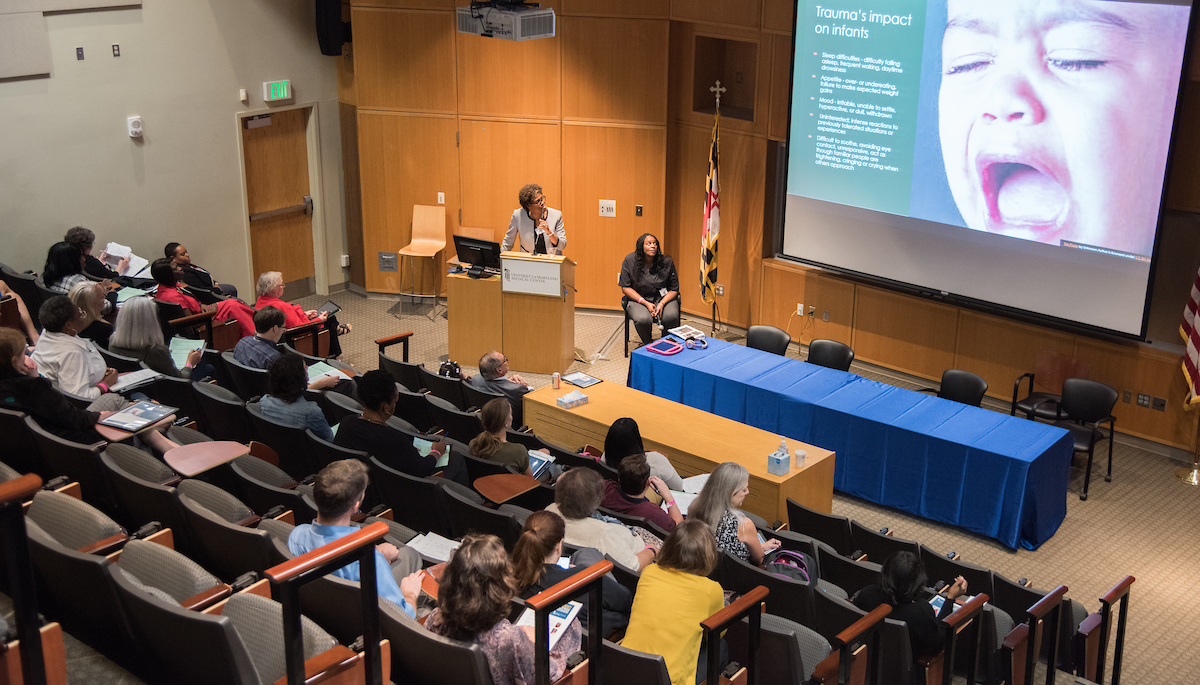Improving the Care of Pregnant Women Living with Maternal Opioid Use Disorder
March 26, 2020 Laura Hager
Sharing evidence-based integrated strategies to give women the support and resources they need to get treatment and help their children grow.
Researcher:
Doris Titus-Glover, assistant professor
Member, Maryland Department of Health’s Maryland Maternal Mortality Review Stakeholder Group
Areas of Expertise:
Maternal and child health with an emphasis on pregnant and parenting women with maternal opioid use disorder (MOUD). Titus-Glover's work focuses on medication-assisted treatment (MAT), provider experience, health disparities, maternal obesity, and patient-reported outcomes.
The BIG idea:
Titus-Glover is the principal investigator on a University of Maryland, Baltimore Center for Interprofessional Education (IPE) grant to improve the care of pregnant women living with MOUD. In particular, she is working to advance interdisciplinary educational strategies for managing MOUD (IDEA for MOUD), to guide the understanding of provider/patient barriers, such as lack of integrated care, stigma, and inadequate social supports.
IDEA for MOUD is aimed at developing interdisciplinary teams to learn and share evidence-based integrated strategies to increase knowledge and understanding of treatment modalities; reduce stigma; and promote a sustainable community for continued learning, support, and resource sharing related to MOUD.
Why does the research matter?
“I think about women as pillars that hold up communities,” Titus-Glover says, explaining that women have the power to provide the care for their children that will allow them to grow up to be safe and be productive members of society. “We have to look at this critically to understand that we need to support and empower women for a better community, and a better society. It has to start with women receiving the support and the resources they need to nurture and help their children grow.”
Who does the research matter to?
Titus-Glover is working with an interdisciplinary team from the University of Maryland Schools of Nursing, Pharmacy, Medicine, Social Work, and Law to build a sustainable workforce of health professionals who will apply integrated skills, knowledge, and targeted strategies to manage the care of pregnant women with MOUD and ultimately promote healthy maternal and neonatal outcomes.
What are the clinical applications of the research?
Through her research, learning from both patients and health care providers, Titus-Glover has found that there are many issues that women with MOUD face. “The recommendation is women with MOUD should receive medically assisted treatment, but only about 50% do,” she says, explaining that there is a disconnect among what women learn on the streets, what their providers tell them, and how their treatment is managed. “As providers, we need a better understanding of what these women need, what makes them use opioids, and what the underlying factors are. Without understanding these underlying issues, maternal opioid use disorder is difficult to treat.”
The research has also shown that women with MOUD need access to psychosocial resources. “Providers are calling loud and clear for resources to help support these women,” she says. “For example, transportation and child care. How do these women get to their treatment? And what do they do if they have other kids in the house?”
Through IDEA for MOUD, Titus-Glover plans to lay the groundwork for providers to be engaged in a sustainable learning community to deliver comprehensive and effective MAT. She and the interdisciplinary team organized a daylong conference last fall and a series of follow-up seminars in February to explore the challenges surrounding opioid use and pregnancy. The fall conference focused on integrative and interdisciplinary approaches for the evidence-based care of pregnant and parenting women with MOUD and provided participants opportunities to learn through interactive teaching strategies, case studies, spotlight presentations, and patient stories. Attendees shared ideas about strategies for interdisciplinary care and best practices for treatment among providers as well as the importance of integrating services and incorporating a patient's real-life situations, environments, social support systems, etc. into therapy instead of simply creating treatment programs.
It is vital for nurses and other clinicians to give nonjudgmental, nonstigmatizing, and consistent messages about how to move into recovery. “We need these patients to feel like they can come into the clinic without being talked down to,” Titus-Glover explains. “Otherwise they’ll just avoid getting care. We need to show them respect so they understand that not only is their health at stake, but their children’s health is also at stake.
“A little bit of understanding and giving these women access to the resources they need can really make a difference.”
Image: Jocelyn Gainers, EdD, CAC-AD, AS, executive director, The Family Recovery Program, presents "Community Partnerships, Collaboration, and Policy Implications" at the Interdisciplinary Strategies for Managing Maternal Opioid Use Disorder workshop on Oct. 1, 2019.